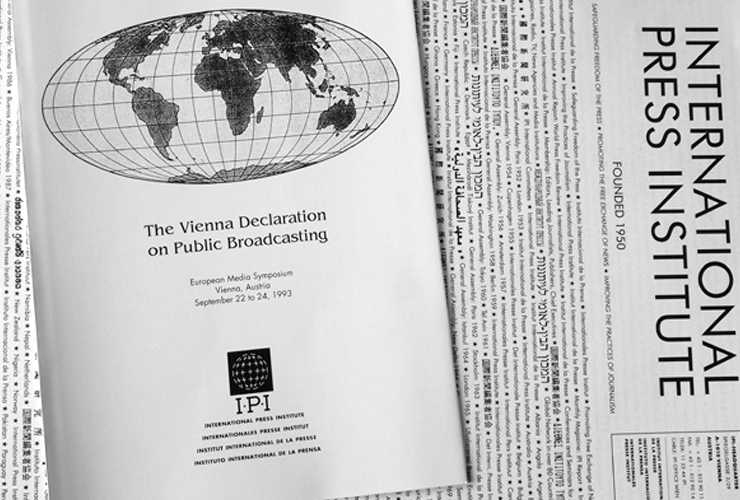The International Press Institute, at its European Media Symposium “From State-Controlled Broadcasting to Public Broadcasting”, held in Vienna, Austria, 22-24 September 1993,
Declares its unconditional support for the development of editorially independent public service broadcasting to replace the state-controlled broadcasting structures, which continue to exist in Eastern Europe and therefore,
Recalling the Universal Declaration of Human Rights, Article 19, which states that “everyone has the right to freedom of opinion and expression, this right includes freedom of opinions without interference and to seek, receive and impart information and ideas through any media, and regardless of frontiers”;
Recalling the General Conference of UNESCO in 1989 with its main focus on the promotion of the “free flow of ideas by word and image at the international, as well as national levels”;
Recalling UNESCO’s seminars in Windhoek, Namibia, in 1991 and in Alma Ata, Kazakhstan, in 1992, and acknowledging their importance as milestones in the struggle for free, independent and pluralistic print and broadcast media in all regions of the world,
Demands legal and statutory measures which support the right of journalists and program producers in broadcasting organizations to exercise their profession safely and without interference.
Calls for the complete and immediate extension of the freedom of the press to include the freedom of broadcasting. This freedom of the media is to guarantee public broadcasters their independence in the exercise of the tasks conferred upon them. To avoid pressure by the government of the day or other public or private bodies, this principle should be enshrined in national constitutions, broadcasting statutes as well as the statutes of international organizations.
Calls for constitutional and statutory measures to remove the governing and managing bodies of public broadcasters from everyday politics. Leading positions in the media should be open to men and women of achievement, regardless of their political affiliations. Only such openness can create an environment of diversity and high quality.
Proposes that a primary mission of public broadcasting should be to inform people of the issues – past, present and future – that are of direct concern to them. Public broadcasting should also serve as a medium for the expression and debate of basic values.
Calls on managements and staff representations to commit broadcasting journalists to editorial objectivity. The highest aim must be free and fair information for the public. All aspects of an issue are to be presented with journalistic integrity, in a balanced manner and within an appropriate period of time.
Proposes the introduction of guidelines for journalistic practices in the public broadcasting media. These guidelines are to be developed by the journalists themselves, without interference from governments, political parties or other interest groups.
Demands legal measures to assure diversified funding, including – but not limited to – viewers’ and listeners’ fees, other forms of public funding as well as advertising to an extent which reflects an increasingly competitive environment.
Demands that state and public bodies allow the independent media, including public-service broadcasters, the same free access to all information, material and facilities as the official media.
Demands that public broadcasters and independent media be assisted in the upgrading of the production, content and presentation of television news and current affairs programmes through the provision of new technology and the exposure of staff to modern production techniques.
Proposes the abolition of monopolies and, while not questioning the privileged position of public broadcasters in the exercise of their tasks, of all forms of discrimination in broadcasting and frequency allocation, as well as the abolition of all barriers to the launching of new private media outlets.
In conclusion, IPI believes that public broadcasting should be a true reflection of the constitution, the principles and the attitudes of a free and democratic state.
